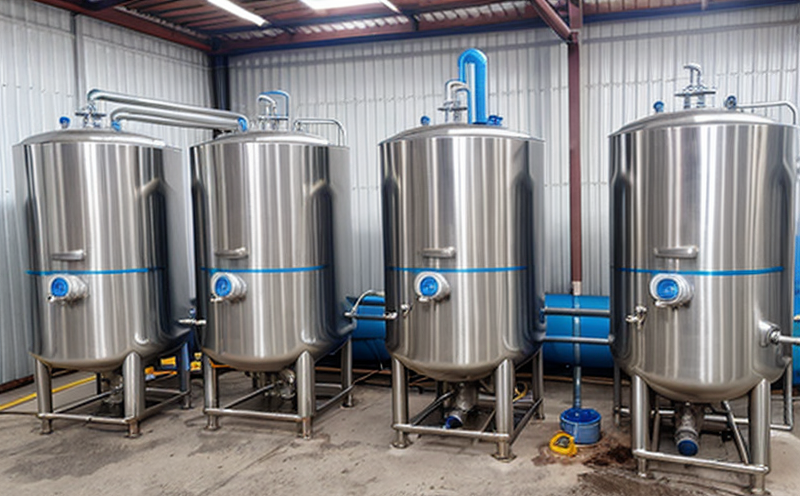ASTM D3919 Selenium Test in Cooling Water
The ASTM D3919 method is specifically designed to determine the concentration of selenium in cooling water, which is crucial for maintaining environmental compliance and ensuring the efficient operation of industrial facilities. Selenium can accumulate in cooling systems due to various sources such as runoff from agricultural land, industrial discharge, or natural waters. Elevated levels of selenium in cooling water not only pose risks to aquatic life but also affect the performance and longevity of equipment within the facility.
The test is critical for industries like power generation, manufacturing, and chemical processing that rely on large-scale cooling systems. By monitoring selenium levels, facilities can prevent corrosion, reduce scaling issues, and minimize the need for expensive repairs or replacements. The ASTM D3919 method provides a standardized approach to ensure consistent and reliable results across different testing environments.
The test involves several key steps: sample collection, digestion of the samples, colorimetric measurement using an appropriate spectrophotometer, and interpretation based on reference standards. It is important that the samples are collected in a manner that minimizes contamination and degradation to ensure accurate results. Proper handling and storage conditions for both raw materials and finished products are critical throughout the testing process.
The method's precision and accuracy have been validated through extensive laboratory trials, ensuring consistency across various environments. This is particularly important given the variability in water sources used by different facilities. The ASTM D3919 test allows facilities to meet regulatory requirements such as those set by ISO 14001 for environmental management systems or EPA guidelines for discharge monitoring.
The results of this test are vital not only for compliance but also for operational efficiency. Facilities that regularly monitor their cooling water for selenium can identify issues early, which helps in preventing costly downtime and potential legal consequences. Moreover, the data from these tests can be used to optimize water treatment processes, improve energy efficiency, and reduce overall environmental impact.
By adhering to ASTM D3919 standards, facilities demonstrate their commitment to sustainable practices and responsible stewardship of resources. This not only enhances their reputation but also contributes positively to the broader community by minimizing ecological damage from industrial activities.
Industry Applications
The ASTM D3919 Selenium Test in Cooling Water is particularly relevant for industries that rely heavily on cooling systems, such as power plants, manufacturing facilities, and chemical processing plants. In these sectors, the quality of water used in cooling processes directly impacts equipment performance and environmental compliance.
For power generation facilities, monitoring selenium levels ensures that boiler tubes and heat exchangers remain free from corrosion and scaling, which can lead to increased efficiency and reduced maintenance costs. Similarly, manufacturing industries benefit by maintaining optimal conditions for their production lines. In the chemical processing sector, accurate testing helps in preventing contamination of final products.
The method's precision is especially important when dealing with complex water sources that may contain various contaminants. By using ASTM D3919, facilities can ensure they are meeting not only local but also international standards such as ISO 5667-2 for optical comparators or EN 14869 for spectrophotometry.
Regular testing allows these industries to detect and address issues early, thereby minimizing disruptions. For instance, if selenium levels exceed acceptable limits, adjustments can be made in real-time to mitigate potential risks. This proactive approach not only enhances operational reliability but also supports a culture of continuous improvement within the organization.
Competitive Advantage and Market Impact
The ability to accurately measure selenium levels in cooling water provides significant competitive advantages for industries that are heavily dependent on water resources. In an era where sustainability is increasingly valued by consumers, stakeholders, and regulators alike, facilities that demonstrate their commitment to environmental responsibility through rigorous testing protocols stand out.
By adopting ASTM D3919 as part of their quality assurance processes, companies can differentiate themselves in the market. This not only enhances their reputation but also opens up opportunities for partnerships with environmentally conscious clients or suppliers. Additionally, compliance with such stringent standards can lead to reduced operational costs due to fewer regulatory fines and lower insurance premiums.
The data generated from these tests can be leveraged strategically to improve product quality and safety. For example, in industries where water contamination could affect the purity of final products, regular testing ensures that only high-quality raw materials are used. This translates into higher customer satisfaction and potentially increased market share.
Moreover, adherence to international standards like ASTM D3919 fosters trust among stakeholders. Investors, employees, and communities all appreciate organizations that prioritize environmental stewardship. Such actions contribute positively to the company’s brand image and long-term success in competitive markets.
Use Cases and Application Examples
The ASTM D3919 Selenium Test is widely used across various industries where cooling water plays a crucial role. Below are some detailed case studies illustrating its application:
- Power Generation: A large power plant uses ASTM D3919 to monitor selenium levels in its cooling water system. Regular testing helps them identify potential issues early, ensuring that their equipment remains efficient and free from corrosion.
- Manufacturing: An automotive manufacturer utilizes the test method for monitoring cooling systems during production processes. This ensures that all parts are manufactured under optimal conditions, leading to improved product quality.
- Chemical Processing: A chemical company employs ASTM D3919 to maintain the purity of their products by preventing any contamination from cooling water. This approach enhances customer trust and satisfaction.
In each case, adherence to the ASTM D3919 method ensures consistent and reliable results, which are essential for maintaining high standards in these industries.





